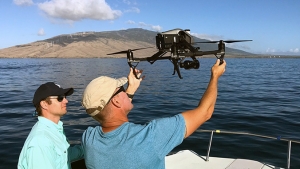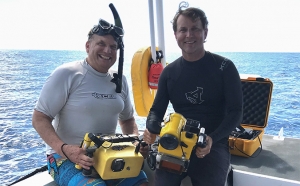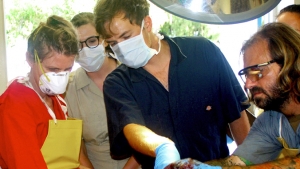
Uncovering the mysteries of Hawaiʻi’s humpback whales and helping to better understand anthropogenic and climate change effects on marine mammals are just a couple of ways University of Hawaiʻi researchers contribute to science and our community. UH researchers were recently featured on the National Oceanic and Atmospheric Administration (NOAA) Fisheries website for their scientific endeavors.
Adam Pack
Adam Pack, professor of psychology and biology at UH Hilo and cofounder of the Listening Observatory for Hawaiian Ecosystems Bioacoustics Lab.
Pack co-founded The Dolphin Institute, a Hawaiʻi-based non-profit organization, and is a cooperating faculty in UH Mānoa’s marine science graduate program. NOAA said, “Pack has collaborated with NOAA Fisheries for decades, providing valuable insight into the behavioral ecology and communication systems of humpback whales, Hawaiian spinner dolphins and other marine mammals, and to our understanding of dolphin sensory perception, cognition, and language abilities.”
Lars Bejder

Lars Bejder, director of the Marine Mammal Research Program at UH Mānoa’s Hawaiʻi Institute of Marine Biology.
NOAA said, “He has studied numerous species of cetaceans over his research career of 25 years, including Hawaiian spinner dolphins and how they’re affected by dolphin tours and other human interactions. He has closely collaborated with both the NOAA Fisheries Pacific Islands Regional Office and Pacific Islands Fisheries Science Center, as well as numerous other organizations, universities and individuals throughout Hawaiʻi and the world.”
Marc Lammers

Marc O. Lammers, UH Mānoa graduate and affiliate research faculty at UH Mānoa’s Hawaiʻi Institute of Marine Biology and marine biology graduate program, who helped to pioneer the acoustic monitoring of coral reefs.
Lammers is currently the research coordinator of the Hawaiian Islands Humpback Whale National Marine Sanctuary, and founded the non-profit Oceanwide Science Institute. He and Pack have collaborated on many projects including studying whether the acoustic characteristics of male humpback whale song are related to a singer’s fitness and fertility. NOAA said, “Lammers has played a pivotal role in advancing bioacoustic monitoring research within the Pacific Islands region and abroad.”
Kristi West

Kristi West, affiliate research faculty at UH Mānoa’s Hawaiʻi Institute of Marine Biology.
NOAA said, “West’s lab conducts postmortem cause-of-death investigations of stranded cetaceans throughout both the Hawaiian Islands and the greater Pacific Islands, including American Samoa, Guam and Saipan. These investigations involve necropsies (an autopsy of an animal) and the collection of extensive biological samples, which the group uses for research to better understand the biology, ecology and threats of the region’s cetaceans.”

